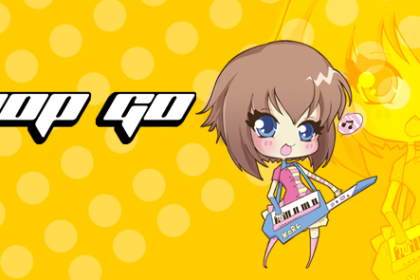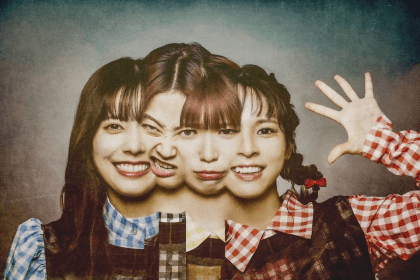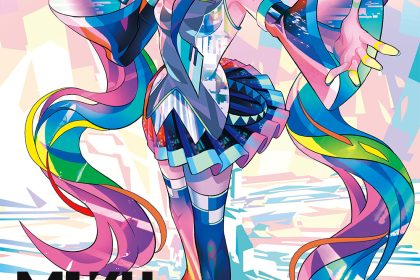
Shooting for the stars…
With her debut album Spades & Stars just released, Himezawa has had an opportunity to reflect on her fortunes since relocating to Japan several years back.
The German-born musician, model, author and performer had started her career in Japan as part of Asobisystem, before focussing on an independent music career, which culminated in the release of the single ‘Wagamama Love’ in 2015.
Prior to this, Himezawa (aka Sabrina Schultes) had spent time in the UK establishing herself as a noted cosplayer and performer at events such as the MCM Expo, Hyper Japan, London Anime Con and Anime Attacks. It was while in the UK that she drew the attention of Asobisystem, which provided the impetus to relocate to Japan.
But it was the world of music that remained her true passion. Inspired by the likes of Daoko and Perfume, Himezawa joined forces with independent Japanese label Grow Seeds to release the melodic J-pop charms of ‘Wagamama Love’. But despite the immediacy of the single’s power, there was a significant gap before she returned this year with the Spades & Stars album.
“I took a long break to think about what music I want to make rather than what I think people want me to do” recalls Schultes, “I wanted to make songs that can tell my story and that I can perform live, on stage without the popular ‘idol lip sync’.”
Spades & Stars also shows a gear change in terms of style from those early idol pop leanings. There’s a more organic feel to the material on the album, as well as more explicit themes. “Unlike ‘Wagamama Love’ I got to direct and write a big portion of the album myself this time, which includes original composition and instrument choices, I always liked pop/punk music so integrating that part felt very special to me.”
“I feel like I grew a lot since my debut single and would rather continue my journey as a singer / artist than an idol. This album is a statement as well as a big step into that direction.”
The new album also sees Himezawa continuing to work alongside the Grow Seeds label. It’s a relationship that she waxes philosophical about. “GSR worked on commission for me for where I needed them (i.e. licensing), but coordinating recordings, collaborating artists, CD jacket designer, photographer, MV team was held together by myself.”
“I liked this approach in working as both the artist and the producer, it gave me more freedom than I had with ‘Wagamama Love’ where I got sent a demo and lyrics from the few ideas I gave them, but ultimately wasn’t me.”
“It‘s really easy to get things done on time if you don‘t leave everything up to others, that‘s probably the most important lesson I learned since my debut.”
The album opens with ‘Paperplanes’, a percussive guitar-driven number. The album’s title track, meanwhile, is a surprisingly frank affair with its themes of bondage and power dynamics. Much of the lyrical content on the album has, understandably, personal connections to Himezawa’s own history.

“The six songs follow my stories through the past years of my life, starting from a very dark place (‘Paperplanes’) through leaving a relationship (‘I’m a Rebel’) to confessing that not everything is alright after the ‘Happy Ending’ (‘You Tore Me Apart’). ‘Spades & Stars’ is the (explicit warning) main piece of the album that I push at every single live performance because I am so proud of what Flaviyake and I put together for it; The theme of the main song is BDSM, more specifically a love story happening throughout that sort of relationship. Most of the album themes are pretty explicit or widely seen as ‘negative topics’ which is why it is such a big step away from the ‘cute, innocent idol image’ I was cornered into the past years.”
Flaviyake is a Moldavian musician who Schultes met while performing at events in London (an artist that J-Pop Go has also written about previously). More recently, Flaviyake has relocated to the US to work on her own material , but she made a name for herself via tunes such as ‘Electronic Boy’ and ‘Anime Girl’. Her approach is electropop-inspired with some touches of Japanese pop, so at first it might seem as if her collaboration with Himezawa seems misplaced. However, the duet between the pair on ‘Clock Machine’ reveals one of the album’s finest moments.
“Shortly after meeting with my label about the concept of the album I messaged her (while still on the train home” recalls Himezawa,” and she agreed to join. Being a long-time fan of her music I was really nervous to put together a composition for ‘Clock Machine’ with GSR to match her style so we could write lyrics together for the project. Both the audience and me absolutely love the song and the concept of being stuck in this loop created by society, with no visible way out. “Clock Machine” is a pretty metaphor for what is wrong with our society, educational system and work ethics. In Japan people literally work themselves to death (Karoshi), because they “have to” fit in. The song has a very pressuring bass to it in the chorus while mostly kept monotone in the verses and that’s what I like about it the most.”
Naturally, the idea of collaborating with someone based in another country will bring some coordination issues, although this doesn’t seem to have had an impact on Himezawa and Flaviyake’s work together. “Thanks to the time zone difference one of us was always at the studio recording or forwarding vocals, so the work on our songs never really stopped. She was positively surprised on how fast the JAM studio recording team in Japan was and how quick adjustments and mixes were made.”

Spades & Stars is also unusual in that the album features the songs in both English and also Japanese. Being based in Japan, this obviously makes sense although Himezawa is also aware that this approach gives her the ability to take her music outside of the confines of her adopted country. “Should the opportunity come around for me to bring my music to another country, it wouldn‘t have to be in the context of a Japan themed event, I could hold a regular concert. The original lyrics to each song were written in English first and then translated into Japanese following the original meaning”.
As a western artist, working within the Japanese music industry will also bring its own complications. Does she find the experience easy or hard? “Both. For the mainstream music industry, I would say I‘m too far off the grid to even be recognized by one of the big companies and don‘t really want to go down the major label road.”
“For the indie / band / idol scene I don‘t find it hard, though there often is an invisible barrier around me and listeners at performances no matter what (because I’m a foreigner).”
“I‘m doing my best to break that down that wall, walk offstage, talk to everyone in frank Japanese and use mainly Japanese versions of my songs for performances, including the tour I‘m finishing off currently.”
“For lives and promotional work, it‘s surprisingly easy, because I count as „exotic“ in my appearance, however it can be in the way when you want people to listen to your music instead of just looking for what visually stands out. If I had the chance to go back in time, I would hide my appearance completely and only have an illustrator publish artwork of a character instead.”
Spades & Stars represents an evolution in both the style and approach of Himezawa’s music. While many budding musicians still struggle to get off the starting blocks, to have achieved the production of an album in a foreign country also provides a demonstration of what determination and hard work can accomplish.
Spades & Stars is out now on Grow Seeds Records.
https://open.spotify.com/album/5h2CcxThKjU6aCmH2IeYf7








